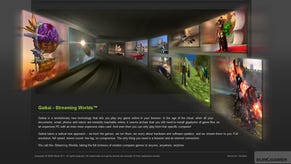Gaikai
Dave Perry sells you into blissful slavery.
"The OnLive model is actually worried about that," Perry argues. "Say they have a million people show up, how the heck are you going to handle that? You're going to have to design a network and fund a network big enough for the peak. We buy servers based on demand, which is a way better business model, because we're building the structure to support what publishers need. We're not selling subscriptions - the publishers are buying the time, and we only offer the time when it's available. If Gaikai only has one server and somebody's got it, no one else can buy it - sorry." And once that server is full - Perry estimates that servers can handle around five users each - Gaikai can buy another, funded by the money it received selling off the gamers active on the existing server.
There are issues that doesn't cover, but Perry reckons he's anticipated most of them. Server time is more valuable during certain periods of the day, for example - you would expect the network to heave during peak hours after work, but you'd expect it to be dead by the time 3am rolls around - so Perry will use a dynamic pricing model similar to the way Facebook, MySpace and Google price their advertising inventories. With dynamic pricing, Perry is confident he will always be able to find a buyer, no matter the time of day, so servers won't lie dormant.
There is also the question of friction - one of the subjects of Perry's Develop Conference speech. Gaikai has the potential to be a great way of avoiding seepage between the point a gamer becomes interested and the point at which it's possible to start playing; it can remove barriers like hardware compatibility and download times. But that's only effective if the Gaikai method doesn't require you to sit through reams of terms and conditions. EA Master Accounts anyone? The Blizzard WOW process?
Perry is keen to point out that the customer - the games publisher - can have whatever they want in the end, but in the meantime he's not just going to tell them they're always right, especially with T&Cs. "I'll be saying, 'Please, put them all into one, just put them all into one and scroll to the bottom, have your legal department really rethink this, can they have us type yes and then we're done? How can you make it as low-friction as possible?' That's what my job will be. If they ignore me and say, 'No, we're not changing anything', fine. The amount of people that come in will probably be higher than today, but it probably won't be as high as it could be."
As for which publishers are involved at the moment, Perry's examples are largely theoretical, but he does claim that three publishers offered to invest in Gaikai during private E3 demonstrations - something he attributes to the nature of the offering. "It's not competitive, and it's a way of reaching new audiences they haven't got today," he says. "It's impossible to do today - I can't get Spore into Kongregate, for example."
For the moment though, Gaikai is still small-scale - just three servers, in Irvine near Blizzard, in Freemont near Adobe (Gaikai uses Flash heavily), and in Amsterdam where the core developers work. Beta sign-ups are live, but we're not using Gaikai ourselves and it doesn't sound like many other people are either. But, Perry argues, even the existence of sign-ups is beneficial to a service facing Gaikai's unique geographical challenges. "In a weird way," he suggests, "the beta test has already begun, because we're collecting statistical information on everyone's connections... I can already tell if you're in California before you even type anything."
The geographical issue is another interesting side of Gaikai. In order to offer interactive content in real time, it relies on a deeper knowledge of the weird way the internet is hooked together than other streaming services like Netflix. Perry clearly enjoys this side of the technology though, and his research also illustrates Gaikai's present small scale.
















